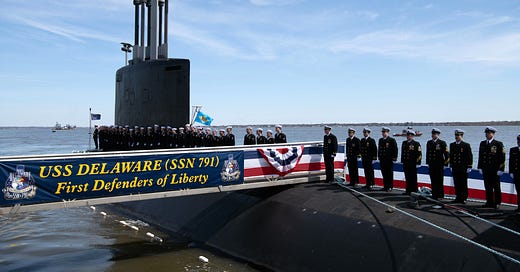Navy fails to reveal records of payments to the Port of Wilmington
Last year, as the Port of Wilmington teetered on financial collapse, the U.S. Navy chose the Delaware facility as its site for a weeklong submarine commissioning celebration that featured President Joe Biden as the keynote speaker.
The invitation-only event was rich in political overtones, bringing in more than a hundred influential Delawareans to hear the president speak at a facility that had long been key to his old Delaware base of support.
The event also appears to have brought in a shot of new revenue to the port’s private operator, GT USA Wilmington, just months after it had run out of cash.
But exactly how much new revenue remains unclear to this day.
Over the 16 months since the event, the Navy has failed to turn over records, sought through a Freedom of Information Act request, that would disclose the amount of money the military paid to GT USA and other companies at the Port of Wilmington for hosting the celebration of the U.S.S. Delaware nuclear submarine.
The failure to turn over the records comes despite a ruling from a magistrate in December directing the Navy to provide a “rolling release” of invoices and other records of transactions.
In recent months, the naval obstinance escalated with the FOIA’s case manager ignoring numerous emails inquiring about the status of the long-delayed open records request.
I sent the FOIA request on April 4, 2022, two days after the celebration of the U.S.S. Delaware. Within it, I specified that responsive records should include invoices, purchase orders and receipts.
From the start, Navy officials moved slowly — initially saying they would respond with records on July 8, 2022.
Then, it was Sept. 15. Then Sept. 27.
The Navy finally sent what it called its “final response” on Sept. 30, almost six months after the initial request.
The response included a single page showing $2.8 million in costs for what it described as the “DELAWARE Commissioning.”
Broken out from the figure was the “April 2, 2022 Delaware Commissioning Direct Costs” totaling $1.9 million.
The Navy’s response did not include any payment records, and so it is unclear whether the dollar figures represented a comprehensive total paid to Port of Wilmington companies, internal military costs, or payments to other third parties.
My doubts about the accuracy of the cost figures grew in later months after the Navy said it identified 111 new invoices that also were responsive to the FOIA request.
Last fall, I appealed the Navy’s response to the FOIA and in December the Navy Judge Advocate General’s office directed the military to provide “a status update, and/or a rolling release of documents to you, as of the date of the 20-working-day deadline after this letter.”
FOIA officials “shall make subsequent releases or updates to you every 15 working days thereafter,” the ruling stated.
The Navy has released no records during the 8 months since then.
In May, a Navy FOIA case manager attributed the delay to Port of Wilmington companies failing to respond to government requests for redactions to the responsive records.
A separate Navy official said such redactions are a requirement before the government can release the documents.
It is unclear whether the Navy has made any progress since May because a new case manager overseeing the request has not responded to messages sent this summer.
Still, it is unlikely that GT USA WIlmington will respond to any further redaction requests because as of last month the company “no longer exists,” its former spokesperson, Kathryn Bradley said.
Bradley — who today serves as spokesperson for the port’s new operator, Massachusetts-based Enstructure — did not respond to a question of why GT USA Wilmington failed to respond to the Navy’s redaction requests in past months.
Contact Karl Baker at kbaker6@protonmail.com or on Signal at 206-595-0057.




